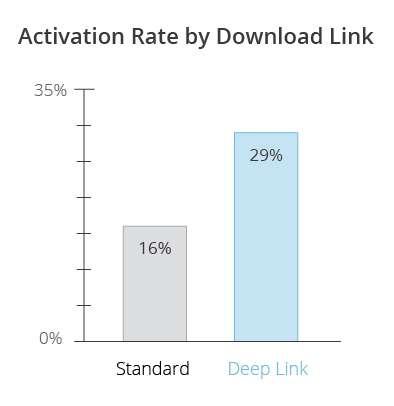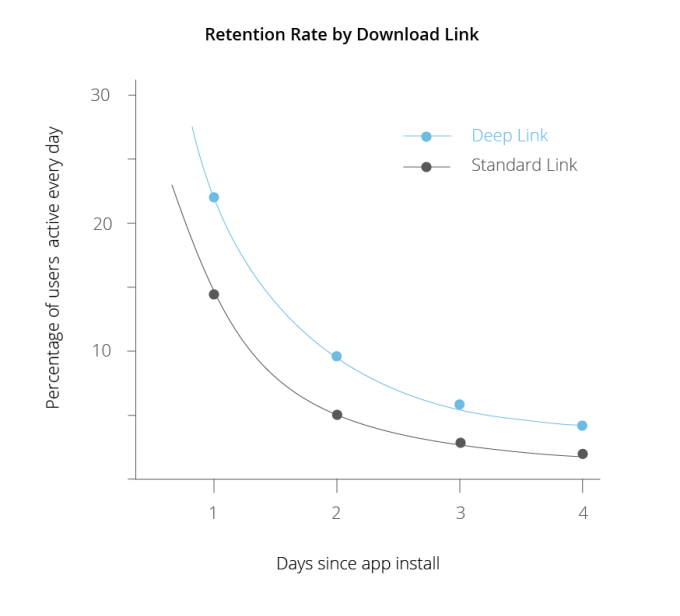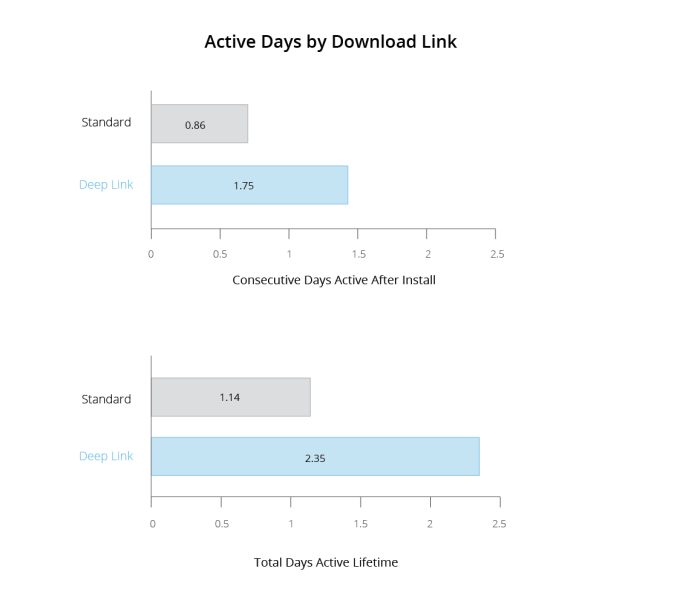Will Lindemann
https://twitter.com/benedictevans/status/580909978736701440
For developers and users, mobile deep linking has been a fantastically anticlimactic technology. Deep linking has existed since iOS 2.0, a time when fewer than 1 in 10 of us had a smartphone and Facebook had around 80 million users.
Over the last seven years, many companies have riffed on the theme of deep linking. They have branded it, marketing their offerings with the lofty promise of making the mobile-app ecosystem function like the web.
Nowadays, every major tech player is fighting to accumulate a stockpile of mobile deep links, as demonstrated by the enormous amount of attention that Google, Apple, Facebook and Microsoft have been paying to deep linking this year.
However, developer adoption of deep linking has been very slow. This is because the true benefit of deep linking was never clear to developers or their businesses. A developer’s time is precious, and most want to get the biggest output for the smallest input. Deep linking didn’t rank very high in the product roadmap.
The core problem was that deep links only really worked if a user already had the app. Because the average phone has fewer than 100 apps installed, and the same apps dominate most phones in the market, deep links were useless for almost every app in the app stores.
Recently, a new type of deep linking has appeared. Contextual deep-linking technology offers deep links that can pass data to an app through install, in addition to supporting the legacy deep-linking method.
This data is used by the app to show the user relevant information when they open the app for the first time (below). This makes deep links useful for users who didn’t have the app, as well as those who already did. Now, deep links work for newly acquired users, not just existing users, driving growth and re-engagement.
Example of contextual deep linking. Close5 (an eBay company) using contextual deep linking with a smart banner. The mobile website banner links to content within the app. A user clicks the download button, installs the app and, after install, is deep linked to the same content in the app.
Intuitively, it makes sense that this is better for users, but we wanted to quantify that hypothesis.
We performed a study on a random sample taken from the Branch network of thousands of apps. We looked at 150,000 anonymized mobile-app users and the links they clicked, comparing two categories: users who downloaded the app organically, and those who downloaded through a contextual deep link.
Contextual Deep Links Double In-App Signups
Unless you’re Facebook, you can’t build a business just counting installs. You need to convert installs into activated users. We used a signup or registration event as a sign that the user was activated after install.
Twenty-nine percent of users who were contextually deep linked immediately after install signed up in the app, versus just 16 percent of regular users, who were not deep linked.
This underscores the role of deep linking in a growth-use case: Users who were delivered a first-time user experience that was relevant to the context from which they clicked were more than twice as likely to activate, once inside the app.

Post-Install Retention Doubles
In partial response to Andrew Chen’s excellent blog post on user retention after first install, we were curious to see if deep linking could help developers with the post-install exodus that plagues new apps.
We found that contextual deep links doubled user retention for the days following install. To measure this, we looked at how many users used the app at least once a day for the days immediately following install. By day 3 after install, 10 percent of deep-linked users were still using the app, versus just 5 percent of non-deep-linked users.

If you’re familiar with app usage data, you’ll note that these retention percentages are quite low. Our network of apps is representative of the entire ecosystem, from large, frequently used apps to small, new launches from independent developers.
You can see from this data both how challenging it is to build a business in this ecosystem, but also how much of a lead this new type of deep linking offers.
Twice The Long-Term Engagement
Continuing on the theme of retention, we were curious to see how the deep-linked experience could improve longer-term engagement for the apps in our sample. The hypothesis was that if the user was delighted with their first experience using the app after install, they would end up visiting the app more frequently thereafter.
We found that, on average, a regular user checks into the app for 0.86 consecutive days after install (they open once and few are active for more than the first session). A deep-linked user sees double the engagement, averaging 1.75 consecutive days immediately after install.
The engagement lift persists beyond the first days after install. Users will spend more consecutive days engaging with the app in the months following download, simply because of their install experience. A deep-linked user averages a streak of 2.35 days of consecutive activity, whereas a non-deep-linked user averages just 1.14.

Build It And They Will Come (But Actually …)
Contextual deep links are making deep linking relevant again, and developers are taking notice. They are being used to build mobile web interstitials, email campaigns, viral sharing, invite or referral features and even desktop-to-mobile transitions.
Despite the enormous improvement in key metrics, users should never notice this shift in deep-linking technology. There won’t be any more of those frustrating moments where you’re taken to the app store when you already had the app, or taken to the home screen after you click a link to a piece of content. Mobile links will just work as they should.
It’s now up to mobile developers to make the mammoth promise of deep links a reality. We’re excited to see what they build.
Contextual deep links have changed my life. — Benedict Evans, VC, a16z, the future. Probably.





























Comment